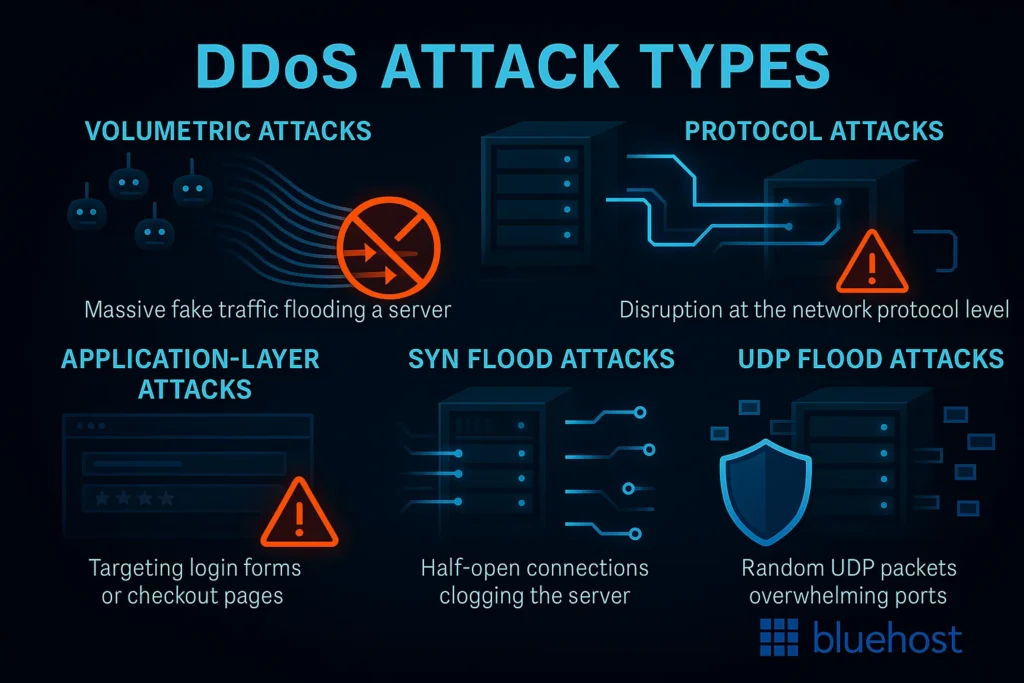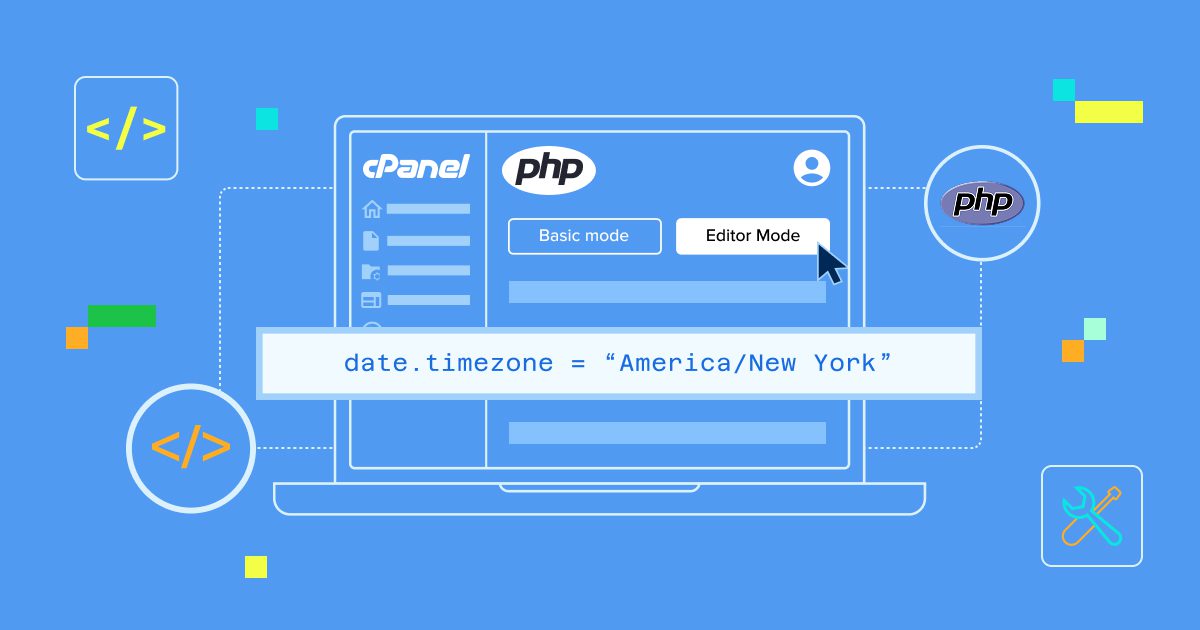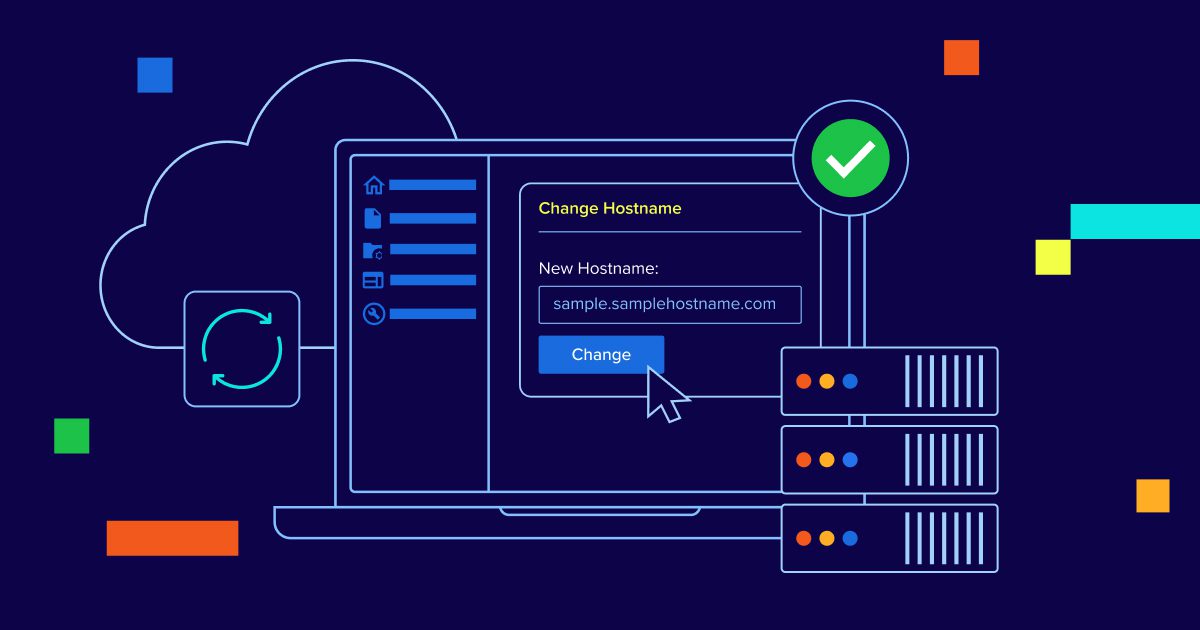Key highlights
- Protect your website with secure VPS hosting featuring dedicated resources and advanced firewall services.
- Manage your server settings and firewall rules easily for tailored data protection hosting.
- Encrypt your VPS connections using SSH and disk encryption to safeguard sensitive data and access.
- Detect and block DDoS attacks in real time with integrated intrusion detection systems and traffic filtering.
- Scale your virtual private server smoothly with flexible RAM, CPU and storage options to handle growing traffic securely.
When it comes to running your website or online business, security is non-negotiable. That’s why choosing secure VPS hosting is more important than ever, especially with the growing threats of cyberattacks like DDoS attacks.
Imagine your site suddenly going offline because of a flood of malicious traffic – that’s where advanced DDoS protection comes in. With secure VPS hosting that includes cutting-edge DDoS defenses, you get the peace of mind knowing your online presence stays up and running no matter what.
Let’s explore how this level of security can safeguard your site and keep your visitors happy.
What are DDoS attacks?
A DDoS (Distributed Denial of Service) attack happens when many systems send fake traffic to a server or network. This flood of requests overwhelms the target and forces it offline.
The main goal of a DDoS attack is to make your website or application unavailable to real users. Unlike other cyberattacks, DDoS attacks don’t steal data – they disrupt access. This disruption is especially dangerous for businesses that depend on consistent uptime and performance.
Hackers often use botnets, which are networks of infected devices, to send massive volumes of requests at the same time. If your server lacks secure VPS hosting and proper defense tools, it may crash under the pressure of a DDoS attack.
Types of DDoS attacks
DDoS attacks come in various forms, each targeting different parts of your server or network to disrupt service. Here are the most common ones:

1. Volumetric attacks: These overload your server’s bandwidth with massive amounts of traffic. Think of it as a digital traffic jam- your real users can’t get through.
2. Protocol attacks: These target weaknesses in server protocols like TCP, DNS or ICMP. They use fewer resources but cause major disruption to network equipment.
3. Application-layer attacks: These go after your actual website or app, mimicking real users to crash login pages, search bars or checkout systems. They’re harder to detect.
4. SYN flood attacks: This attack sends repeated requests to connect to a server but never completes the handshake, locking up system resources.
5. UDP flood attacks: The attacker sends UDP packets to random ports, forcing your server to respond constantly and waste bandwidth.
These attacks can be relentless and no site is too small to be targeted. So, what can you do about it? That brings us to a key question:
Why is secure VPS hosting your first defense against DDoS?
DDoS attacks are escalating rapidly in 2025. In the first quarter alone, Cloudflare mitigated 20.5 million DDoS attacks, marking a staggering 358% increase compared to the same period in 2024.
These attacks are not only more frequent but also more intense. Some have reached peaks of 6.5 terabits per second, among the largest ever recorded.
Shared hosting environments often lack the necessary defenses against such sophisticated threats. They typically offer limited security measures and shared resources, making them vulnerable to disruptions.
Secure VPS hosting provides a more robust solution:
- Dedicated resources ensure your applications have the necessary bandwidth and processing power.
- Enhanced control over server configurations and security settings.
- Improved isolation reduces the risk of cross-contamination from other users.
- Scalability to handle traffic surges without compromising performance.
By opting for secure VPS hosting, you equip your digital infrastructure with the resilience needed to withstand the evolving landscape of cyber threats in 2025.
What should you look for when choosing your VPS hosting plan?
Look for secure VPS hosting plans that offer dedicated resources, strong security measures like firewalls and encryption, reliable uptime, scalable performance and responsive support.
Not all VPS plans offer the same level of protection or performance. If your priority is data protection hosting and secure server plans, you need to look deeper than just pricing.
Here’s what to focus on when choosing a virtual private server:

1. Server uptime
Downtime isn’t just annoying- it can cost your business money and damage trust. Look for a reliable hosting provider that guarantees at least 99.9% uptime, backed by redundant data centers and failover systems. This ensures your website stays online, even during traffic spikes or cyberattacks.
Also read: Monitoring Your Uptime
2. Server speed
Performance matters for both user experience and SEO. Your VPS server should offer scalable RAM, high-speed SSD storage and dedicated CPU cores. With dedicated resources, you avoid slowdowns caused by noisy neighbors-something that’s common with shared hosting services.
Also read: SSD VPS Hosting: The Smarter, Faster Hosting Choice in 2025
3. Security
Security is non-negotiable. Choose secure VPS hosting that includes a powerful Sitelock firewall security service, intrusion detection systems, DDoS protection, disk encryption and options to encrypt files, logs and passwords. You should be able to configure firewall rules, enable SSH access and control iptables directly from your dashboard.
Also, check for features like:
- Encrypted VPS connection for secure remote logins
- Regular manual snapshot options for quick rollback
- Isolation from other servers to prevent data breaches
4. RAM
Don’t underestimate the importance of memory. More RAM means faster server response times, especially when running apps, managing multiple devices or processing larger files. Always choose a VPS that lets you easily manage and upgrade resources as your site grows.
5. Support
A strong hosting provider offers more than just infrastructure. You’ll want 24/7 support from real experts who can help with server settings, operating system issues, network configurations, reboot commands and more. This is especially helpful when you’re dealing with custom software installs or brute force login attempts.
When all these elements come together, you get more than just hosting. You get a complete security solution that gives you peace of mind, total control and room to scale.
How to secure VPS hosting for DDoS attacks?
Securing your VPS server against DDoS attacks starts with the right setup, proactive tools and smart server management. A basic firewall isn’t enough. You need layered protection built into your secure VPS hosting plan. Here’s how to do it:
1. Use advanced firewall rules and intrusion detection systems
Set up custom firewall rules using tools like iptables to filter out malicious IP addresses. A reliable firewall service helps block suspicious traffic before it reaches your server. Combine this with intrusion detection systems to detect abnormal patterns and brute force attempts in real time.
2. Encrypt everything at rest and in transit
A true encrypted VPS connection ensures your data, passwords and config files stay protected during transfer. Enable SSH access with strong keys and set up disk encryption for sensitive file storage. Don’t leave your data exposed- encrypt what you store and what you send.
3. Configure rate limiting and anti- DDoS tools
Adjust your server settings to throttle traffic and prevent overload. Many hosting providers offer built-in anti-DDoS tools that analyze behavior, filter fake requests and mitigate volumetric attacks automatically. Make sure your virtual private server supports these security measures.
4. Use isolated resources and secure data centers
DDoS attacks can affect shared environments. With secure server plans, your VPS uses isolated CPU, RAM and storage-keeping your performance safe from external threats. Look for a hosting provider with globally distributed, Tier-III or higher data centers for greater redundancy.
5. Enable automated monitoring and logging
Use server-side log tracking tools and monitoring systems to keep an eye on spikes in network activity. Many hosting services let you set up alerts for traffic anomalies, blocked ports or system errors-helping you respond before it’s too late.
6. Take regular manual snapshots and backups
Always be ready to recover. Enable manual snapshot features to back up your system, files and server configuration regularly. This ensures quick recovery in case of downtime or corrupted data during a DDoS attack.
With the right setup, you don’t just survive an attack-you outsmart it. A secure VPS hosting plan with built-in security tools, encryption and smart server control gives you the upper hand.
Also read: Is My Website Protected Against DDoS Attacks?
Taking proactive steps to secure your VPS hosting is crucial. It is also important to understand exactly how a DDoS attack can impact your server and disrupt your services.
How does DDoS attack impact VPS server?
A DDoS attack may not steal your data – but it can still cause serious damage to your VPS server. When thousands (or millions) of fake requests hit your network all at once, your resources get maxed out. That means your CPU, RAM and bandwidth get drained – fast.
Here’s what typically happens during a DDoS attack:
- Server performance drops as the system tries to handle massive incoming traffic.
- Legitimate users get blocked, unable to access your website, app or services.
- Brute force attempts may follow, using the chaos to try and guess login credentials.
- Firewall rules get overwhelmed if they’re not properly configured.
- Your operating system may even crash or need a forced reboot.
Even short-lived attacks can lead to downtime, data breaches and lost revenue. Worse, repeated hits can leave your data privacy and infrastructure exposed – especially if you’re running default server settings with no layered security in place.
DDoS attacks can overwhelm even well-configured servers if left unprotected. That’s why having a secure VPS hosting provider with advanced defenses is essential. Not all hosts respond to threats the same way, so it’s important to understand how your provider safeguards your server and keeps your site online under pressure.
How does Bluehost defend against DDoS attacks?
At Bluehost, we’ve built our VPS hosting platform with security at the core. We know DDoS attacks are more than just a temporary glitch- they’re a direct threat to your website, your users and your business. That’s why every Bluehost secure VPS hosting plan is designed to help you prevent, detect and respond to these attacks- fast.
Our virtual private server environment gives you full isolation, advanced controls and powerful tools to keep your data safe and your services running smoothly.

Here’s how we defend your VPS server from disruption:
What Bluehost VPS hosting offers:
- Real-time DDoS monitoring and mitigation: We actively detect and block abnormal traffic patterns to protect your network, CPU and RAM from getting overwhelmed.
- Integrated firewall service: We provide a built-in firewall that lets you create custom firewall rules, block unwanted IP addresses and secure all open ports.
- Encrypted VPS connection with SSH access: All connections are encrypted using secure SSH, so your data, passwords and file transfers stay protected from interception.
- Disk encryption and secure data centers: Your disk is protected with top-tier data protection features and all data is stored in Tier 3-certified data centers with physical and digital security.
- Manual snapshot and rollback options: Take instant manual snapshots of your server to back up critical data and settings. Restore easily in case of attack or misconfiguration.
- Custom server management tools: Access powerful tools to manage server settings, restart your instance, adjust iptables and fine-tune your infrastructure on demand.
- Dedicated resources and isolated environment: Unlike shared hosting, Bluehost VPS gives you full control over your resources, ensuring consistent performance and data privacy.
- 24/7 support from hosting security experts: Our team is always available to help you resolve threats, tune your configuration and optimize your hosting environment.
With Bluehost, you don’t just get a hosting provider – you get a security partner. Our mission is to help you build, run and protect your website with confidence. Now, let’s explore the key benefits of encrypted VPS connections and robust access controls.
What are the benefits of encrypted VPS connections and access controls?
Encrypted VPS connections and access controls protect your data, ensure privacy, prevent unauthorized access and help maintain compliance with security standards.
Let’s break down the key benefits of using secure server plans that prioritize encryption and controlled access:
1. Enhanced security
Encryption protects your files, passwords and server settings from hackers and data thieves. With encrypted traffic over SSH, your sensitive data can’t be read, intercepted or altered during transmission.
2. Improved privacy
Private access keys and IP whitelisting ensure only authorized users can connect. This helps keep your VPS server usage private – even from other devices on the same network.
3. Data integrity and compliance
Encrypted storage and access controls help meet data compliance standards like GDPR or HIPAA. You protect the accuracy and integrity of your data – no tampering, no leaks.
4. Protection against cyber threats
Brute force logins, credential stuffing and sniffing attacks are harder to pull off when you have disk encryption, SSH-only access and secure firewall rules in place.
5. Bypassing geo-restrictions and censorship
Using secure connections allows you to manage your server from anywhere, even in regions with restricted internet. This is especially useful for remote teams and developers abroad.
6. Facilitating remote work
With secure access and user-level controls, teams can easily manage servers without compromising the system. Role-based permissions mean your developer doesn’t need the same level of access as your admin.
Encryption and access controls are the foundation of modern data protection hosting. With Bluehost, these security measures come built into every VPS hosting plan – so you can focus on growing your website, not defending it.
Final thoughts
Security isn’t optional anymore. If your site handles sensitive data, runs client apps or simply can’t afford downtime, it’s time to upgrade from basic hosting. Choose a VPS server that prioritizes security and gives you full control.
Take action now with Bluehost. Our secure VPS hosting delivers dedicated power, complete access, built-in firewall protection, disk encryption and expert support – ready whenever you need it. Don’t wait for an attack to happen. Protect your website and data with a hosting solution built for peace of mind and future growth.
Secure your digital space – launch your Bluehost VPS hosting plan today.
FAQs
Secure VPS hosting is a type of virtual private server service that provides advanced security measures like firewall service, intrusion detection systems, encrypted VPS connection and dedicated resources. It ensures strong data protection hosting and keeps your server and website safe from cyber threats.
DDoS protection in VPS server plans uses a combination of firewall rules, intrusion detection systems and real-time traffic analysis to block malicious IP addresses and filter fake requests. This helps maintain server uptime and prevents downtime caused by overwhelming traffic floods.
An encrypted VPS connection secures the data transmitted between your device and the VPS server using protocols like SSH encryption. This protects sensitive data, passwords and file transfers from interception or unauthorized access.
Yes, with secure VPS hosting, you can easily manage and configure server settings, including firewall rules, iptables, SSH access and disk encryption to tailor your security measures and protect your data centers and infrastructure.
A virtual private server offers isolated resources like CPU, RAM and storage, providing better data privacy and data protection than shared hosting. It also allows full control over security configurations, reducing the risk of data breaches and performance issues.



Write A Comment